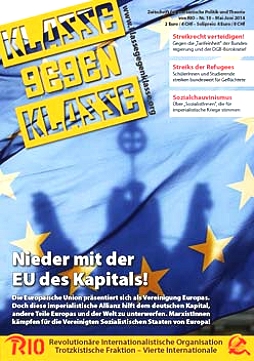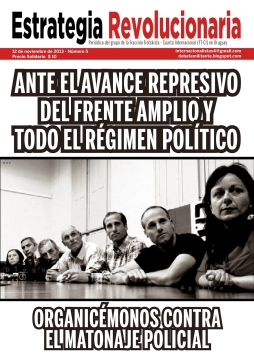Europe
G8 Summit: Escalating repression in Germay
28/05/2007
From June 6 to June 8, 2007, the next summit of the Group of Eight
(G8), a meeting of chiefs of state and of government of the 7 most
important imperialist countries on earth: Germany, Canada, the US,
France, Italy, Britain and Japan, plus Russia, will take place in
Heiligendamm, Germany. The meeting will be held in a seaside resort on
the coast of the Baltic Sea, near the city of Rostock, and it is
predicted in advance that it will not be an event that takes place
peacefully.
As has happened since 1999 in Seattle, and over and above the sharp
decline the movement suffered after the imperialist invasion of Iraq
in 2003, which it could not stop, the summit in Heiligendamm will
find itself accompanied by protests led by groups of young activists
and various organizations and individuals belonging to multiple
political or social tendencies. Among them will be the environmental
and anti-nuclear movements, anti-globalization or radical leftist
movements, anti-fascist and autonomist groups, youth from political
parties and other groups. This year these groups are carrying out the
arduous work of organizing protest marches, acts of civil
disobedience, blockades. However, the security measures the German
government is taking for the conference are outrageous. The
headquarters for the summit has been surrounded with metal railings 12
km [in length] and 2.5 meters high, topped with barbed wire, which
cost more than 12,000,000 Euros. All types of meetings are prohibited
within the security zone and up to 200 meters beyond the railings, as
well as in the airport and at other points in the region. The police
deployment will be some 16,000 troops strong from the whole country,
the biggest [cop] presence ever assembled in the Federal Republic of
Germany during peacetime. The Germany navy and two US warships will
patrol the waters of the Baltic Sea. Air traffic over the site of the
meeting will also be suspended for three days. A nearby prison of the
state of Mecklenburg has been emptied and set aside so that once
demonstrators are arrested, they can be imprisoned for up to eight
days. Schäuble, the Minister of the Interior, has decided to
re-establish checkpoints [abolished by the Schengen Agreement] [1] on
German borders temporarily.
Government repression ...
The German Attorney General unleashed a ferocious attack on activists
of movements against the summit, beginning with a wave of raids. Early
Wednesday morning. May 9, in several states, more than 900 cops,
acting under the pretext that attacks were planned during the G8
Summit in Heiligendamm, raided around 40 dwellings in Bremen, Berlin
and Hamburg, housing projects and offices of leftist organizations,
confiscating computers and other media as well as all types of
information. The German Attorney General, alleging "creation of a
terrorist organization to hinder the G8 Summit" and empowered by Law
129 (special anti-terrorist law), gave the order for the repressive
forces of the German imperialist state to carry out the raids, whose
main aim is to criminalize and intimidate the most radical groups of
the anti-G8 movement. After the raids, the press disclosed that the
German government was trying to modify the special anti-terrorist law
to make it even more repressive (the minimum number of people that
would constitute a terrorist organization would be reduced from three
to one). Corroborating the fact that [the German government is
carrying out] preventive repression against anti-G8 activism, the 21
people suspected of terrorist acts and arrested, were released for
lack of evidence. However, the campaign of repression and
criminalization of the protest movement against the G8 Summit
continues. Schäuble, Minister of the Interior, announced that there
will be massive jailings and that police operations will be very
harsh. And the fact is that the coalition government of Christian
Democrats and Social Democrats is trying to avoid a radicalization and
widening of protest that enjoys high rates of popular support,
according to polls, in spite of the media campaign to discredit it. As
a reflection, although distorted, of dissatisfaction among the masses,
elections in the state of Bremen on May 13 once more corroborated the
erosion of institutions. The parties of the governing coalition won,
but lost many votes, and Die Linke [2] grew stronger and will be
represented in the parliament of eastern Germany for the first time.
All this together with two big strikes in the service sector and
telecommunications [3], that help make the situation more tense. In
recent days a message of support for the demonstrations against the
summit has come from the VER.DI union.
... and the response of the young activists
Several demonstrations occurred in various regions and cities of the
country as a response to the repressive police attack and in
solidarity with those persecuted by the German police and the thugs of
the state. Thousands of people came out to the streets spontaneously
on May 10 to protest against cop repression and reaffirm their
commitment to struggle against the summit of the imperialist
plunderers. For several hours, big groups of youth confronted the
police by throwing stones and building barricades. The government’s
war, which runs from naked violence through the attempt to divide the
movement into peaceful demonstrators and "terrorists", to resorting to
the suppression of constitutional democratic freedoms with the aim of
guaranteeing the legal framework for repression during the summit,
shows, once more, that bourgeois democracy uses its [state] machines
to guarantee the exploitation of the workers and the people and to
repress all those who oppose it.
*Translation by Yosef M.
=====
[1] The Schengen Agreement anticipates, among other things, an end to
controls on travelers through common borders.
[2] The party Die Linke is the result of the fusion between the PDS
(successor to the former governing party of the German Democratic
Republic) and the WASG (a split from the social democratic SPD). The
electoralist party Die Linke has as its model the Italian Partito
della Rifondazione Comunista, an accomplice in the imposition of
austerity plans and precarious conditions of employment on the Italian
masses.
[3] The German proletariat and masses have found themselves confronted
in recent years by severe neo-liberal measures, from the worsening of
conditions for getting unemployment benefits, reforms of the health
care system to the detriment of the most impoverished social strata,
raising the age of retirement to 67, among others.












